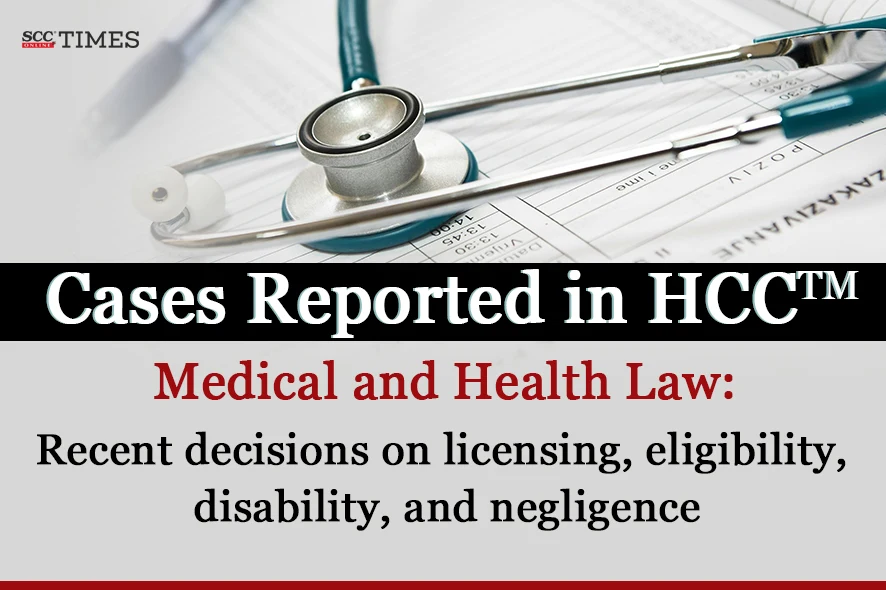Stay updated with key High Court rulings on Medical and Health laws in India. This concise overview highlights recent HCC cases on medical eligibility, registration, licensing, organ transplant rules, disability criteria for medical education, and standards for criminal medical negligence.
A. Medical and Health Law — Eligibility and Right to Practise Medicine Operate/Run Clinics/Nursing Homes/Hospitals, Etc. — Registration/Enrolment to practice — Pre-requisite/eligibility criteria to appear in post degree screening test or register as medical practitioner in India — Obtaining eligibility certificate before pursuing medical course abroad — Held, Indian citizen who obtained medical qualification from abroad can be granted registration by Medical Council of India (MCI) to practice medicine in India provided: (a) he had obtained eligibility certificate from MCI to take admission in foreign country to study medicine; and (b) he cleared post degree screen test prescribed — S. 13(4)(B) of the Medical Council Act, 1956 requires eligibility certificate, issued by MCI, to be obtained before undertaking medical course abroad — Eligibility certificate, to be produced by candidate to appear in FMGE and subsequent registration in India — Student does not have right to apply for Eligibility Certificate, after undertaking medical course abroad — Candidate who obtains qualification without obtaining eligibility certificate, ipso facto ineligible to appear in screening test or register as medical practitioner in India — Petition dismissed [Hemica Rani Singh v. National Medical Commission of India, (2024) 3 HCC (Del) 538]
B. Medical and Health Law — Medical Practice and Practitioners — National Exit Test (NExT) — Object of the test — Held, NExT is a common final year undergraduate examination to be undertaken, before a graduate in any Indian System of Medicine can be given a licence to practice as a registered medical practitioner — Objective for prescribing NExT is to bring in uniformity in summative evaluation across country with reference to minimum common standards of education and training of a medical graduate — Purpose of NExT is to certify eligibility of medical graduates to register and to practice the modern system of medicine in India — These regulations merely prescribed minimum standards to be fulfilled by those who study in those institutions — Appellants unable to show any infringement of their legal rights with introduction and applicability of NExT exam — Salutary purpose of introducing licentiate exam for professionals in order to ensure higher standards of professionalism — Appeal dismissed [Jiwesh Kumar v. Union of India, (2024) 3 HCC (Del) 299]
C. Medical and Health Law — Transplantation of Human Organs — Transplantation of Human Organs and Tissues Rules, 2014 — Rr. 7, 21 and 23 — Pre-transplantation interviews — Importance of interviews — Delays in pre-transplantation of interviews — Effect of —Held, formal approval for transplant must be granted within two days; otherwise, it would be considered that said formal approval had been granted — When proposed donor and recipient are not near relatives, an interview with a near relative or an adult person related to donor by blood or marriage must be conducted to ascertain awareness of donation intention, authenticity of link, and reasons for donation — Any strong views or objections from such individuals should be documented — In determining eligibility of an applicant to donate, Authorisation Committee must personally interview the applicant it necessary to establish timelines under Rules, 2014 — Further held, a time-bound approach is crucial to maintain integrity and effectiveness of organ transplantation protocols — This would also be in furtherance of right to health under Art. 21 of the Constitution — Appeal allowed [Amar Singh Bhatia v. Sir Ganga Ram Hospital, (2024) 1 HCC (Del) 1]
D. Medical and Health Law — Indian Medical Council Act, 1956 — S. 33 — Eligibility criteria of minimum physical fitness for admission to undergraduate medical course — Petitioners suffering from disabilities certified by disability board to be not eligible to undertake medical education — Locomotor disability of type (f) “others” such as amputation, poliomyelitis, etc. — Expert opinion regarding physical fitness — Held, court cannot sit in appeal over the decision of MCI to ignore opinion of experts while issuing Regulations — When the experts in the field have opined against the petitioners, the court would not be justified in sitting over as an appellate authority against the opinion formed by the experts more particularly when there are no allegations of mala fides [Vaidehi v. Union of India, (2023) 1 HCC (Bom) 663]
E. Medical and Health Law — Medical negligence — Adverse or Untoward incident — Distinguished from — Criminal prosecution for medical negligence — Guidelines in respect of — Held, a mere deviation from normal professional practice is not necessarily negligence — nor could mere accident or untoward incident be termed negligence, also an error of judgements not negligence per se — To convict a professional for criminal negligence, the prosecution must prove culpable and gross negligence beyond reasonable doubt — Further, held, in order to prove the existence of criminal rashness or criminal negligence, it shall have to be found out that the rashness was of such a degree as to amount to taking a hazard knowing that the hazard was of such a degree that injury was most likely imminent [Philips Thomas v. State of Kerala, (2023) 1 HCC (Ker) 30]


